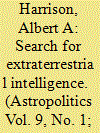|
|
|
Sort Order |
|
|
|
Items / Page
|
|
|
|
|
|
|
| Srl | Item |
| 1 |
ID:
122525


|
|
|
|
|
| Publication |
2013.
|
| Summary/Abstract |
A product of science, religion, and national culture, cosmism is reflected in academic and popular views about our place in the universe, space exploration, and human destiny. Although linked historically to the Russians, cosmism captures many aspects of American thinking about space. The present comparison shows that prophets, prophecies, striving for perfection, utopian visions, and hopes for salvation are evident in both Russian and American thought, but that there are also differences. Geert Hofstede's cross-cultural research on national values-power distance, individualism, masculinity, and uncertainty avoidance-is useful for understanding Russian-American differences. Russian acceptance of power inequalities, collectivism, concern for group welfare, and aversion to uncertainty lead to constellations of beliefs and emotions about spaceflight that differ from those bred by American egalitarianism, individualism, obsession with personal achievement, and acceptance of uncertainty. Both Russian and American thinking include occult and paranormal phenomena, but Americans have been more reluctant to assimilate such influences within mainstream science. As a concept, American cosmism captures the occasional blurring of the lines between religion and science in discussions of humanity's place in the universe and future in space.
|
|
|
|
|
|
|
|
|
|
|
|
|
|
|
|
| 2 |
ID:
103929


|
|
|
|
|
| Publication |
2011.
|
| Summary/Abstract |
The search for extraterrestrial intelligence (SETI) is a human activity with profound implications for society and culture that fall within the purview of astrosociology. In this article, we review some of the astrosociological aspects of SETI and identify ways to seek evidence-based, rather than purely speculative, answers. Recurrent issues include the organization and conduct of the search; human-alien comprehension and communication; human reactions to the discovery of extraterrestrial life; and the comparative analysis of possible extraterrestrial civilizations. Over the past 50 years, a small but growing number of anthropologists, artists, historians, philosophers, political scientists, psychologists, sociologists, and theologians have applied their expertise to SETI and its possible consequences. The current challenge for astrosociology is not gaining entree to SETI; rather, it is one of increasing the interest of more social and behavioral scientists in the search and its potential effects.
|
|
|
|
|
|
|
|
|
|
|
|
|
|
|
|
|
|
|
|
|